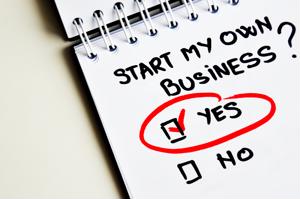
It might be hard for you to know if or when your hobby could be considered a full-time business. Fortunately, the government knows.
According to the Australian Government, the differences between a hobby and a business are clearly delineated. Businesses come with tax, insurance and legal obligations. Hobbies, meanwhile, are done during leisure time solely for pleasure.
The government also clearly defines the purposes of a business as opposed to the purposes of hobbies. The intent of business is to make money; the intent of a hobby is to enjoy a recreational activity. Feel free to use that line next time mum invites you to work in the garden, by the way. If it isn't for pleasure, it isn't a hobby.
Only businesses may have an ABN and register for GST. So should you take these steps to formalise a hobby that has begun to make you money?
If you're on the fence, read on and consider some ways to work up to basing a full-time business on your unique hobby.
Hobbies: the spice of life
So, what is a hobby anyway? It's something you do just for the enjoyment of it. It might be playing or listening to music. It could be painting. Classic hobbies include tinkering in the garden (like mum), surfing and sport, baking and reading. Even playing video games could count as a hobby.
A late 2020 survey by Statista found that Aussies list music, food and travel as top hobbies. These are all pursuits undertaken purely for enjoyment.
When a hobbyist is asked to create a product or service for a friend — perhaps to prepare a special dish for a friend's anniversary or to act as a travel guide to a pal's cousin — she should charge only the costs of her materials, the Australian Government says.
Intent to make money is a sign that your venture may be morphing into a business.
Hold off going formal with a side hustle
If you're reluctant to formally begin a business venture full time, consider thinking of your hobby as a side hustle. Side hustles and gigs are a less-regulated part of the economy, although many actors would like to see that change. For now, though, side hustles can be a way to slowly shift your intentionality. It's a less intimidating way to transition toward becoming a business without taking on the commitment of registering and even relying on your upstart company for regular income.
What's a side hustle? This is informal work done to earn an emergency fund, extra cash or supplementary income. It's done alongside a full-time job, be that paid work or caring for children. Mothers have long relied on "piece work" to make extra income for their families. Back before the Second World War, this could range from watching a friend's child to mending clothes.
According to a study implemented by the design platform Canva, Australia is a great place to have a side hustle, ranking it third among OECD countries for the highest average fee freelancers can earn on Canva at $766.
Sample Side Hustles
There are a myriad of ways to turn a hobby into a side hustle. Love baking? You can start creating cakes for friends as a side hustle to see if you'd truly want to turn your love of confectionery into a bakery biz.
The Daily Telegraph reports that 2 in 5 Australians are earning cash on the side by renting bits of their owned homes or property. Doing so ranges from renting a room to renting space in a shed on the property. Some open their uniquely styled homes for photoshoots. Homeowners with pools rent out their pool by the hour.
Are you good with tools? Have a look at this Sydney Morning Herald piece on millennials who are fixing up camper vans and renting them at rates far exceeding initial expectations.
Perhaps fashion and secondhand shopping is more your speed. Expand your hunt for a bargain into a money-making enterprise by leveraging your knowledge of fashion brands and selling good finds to your social circles.
Of course, a side hustle isn't the same as a reliable income. According to the Australian Council of Trade Unions, there are 2.3 million casual workers in the country including gig workers. More than 400,000 people are working on fixed-term contracts.
"Unreliable work means unreliable income and unreliable spending in local businesses. Stability of work and income for working people underpins the entire economy," said ACTU Secretary Sally McManus.
When to get serious and open a business
Turning a hobby into a full-time business means learning to think of yourself as an entrepreneur engaged in making a living independently.
You'll be setting price points, tracking hours worked and carefully planning. You'll be thinking about adding value for clients, beating competitors, keeping overhead low, marketing and achieving earnings goals.
It's a lot to consider, and plenty of hobbyists are surprised to learn all the considerations they'll need to factor into their business, said Erin Madeley of the Perth Makers Market, via Behind the Brands.
If you believe your hobby or side hustle has the potential to become a business, reach out to WMC Accounting. We take great pride in helping you understand all aspects of launching a successful venture, from business strategy and planning to tax obligations. Contact us today to learn more.



